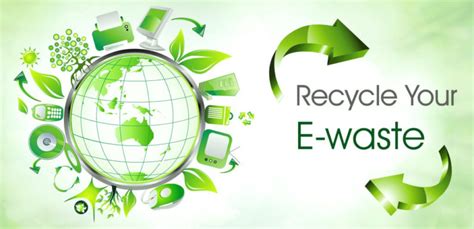In recent years, the world has witnessed a significant surge in the adoption of green technology, with many individuals and organizations embracing sustainable practices to reduce their environmental footprint. One of the critical aspects of green technology is recycling, which plays a vital role in minimizing waste and conserving natural resources. As the demand for green tech continues to rise, it's essential to explore ways to boost recycling in this sector. In this article, we'll delve into five innovative strategies to enhance green tech recycling and promote a more sustainable future.
Understanding the Importance of Green Tech Recycling
Before we dive into the ways to boost green tech recycling, it's crucial to understand the significance of this practice. Green technology, by its very nature, is designed to reduce environmental harm and promote sustainability. However, the rapid obsolescence of green tech products, such as solar panels and wind turbines, has led to a significant increase in electronic waste (e-waste). If not managed properly, e-waste can have devastating environmental and health consequences. Recycling green tech products can help mitigate these issues by recovering valuable materials, reducing landfill waste, and conserving natural resources.

1. Design for Recyclability
One of the most effective ways to boost green tech recycling is to design products with recyclability in mind. This approach involves creating products that are easy to disassemble, reuse, and recycle. By incorporating recyclable materials and designing products with a minimal number of components, manufacturers can significantly reduce waste and make recycling more efficient. For instance, some companies are now designing solar panels with easily removable components, making it simpler to recycle and reuse these materials.
Benefits of Design for Recyclability
- Reduced waste and environmental impact
- Increased efficiency in recycling processes
- Cost savings through reduced material costs
- Enhanced product sustainability and reputation
2. Closed-Loop Recycling
Closed-loop recycling is a process where materials are constantly cycled back into production, reducing the need for virgin materials and minimizing waste. This approach is particularly effective in green tech industries, where materials like copper, aluminum, and rare earth metals are in high demand. By implementing closed-loop recycling systems, manufacturers can recover valuable materials, reduce waste, and promote sustainability.

Benefits of Closed-Loop Recycling
- Reduced waste and environmental impact
- Conservation of natural resources
- Cost savings through reduced material costs
- Enhanced product sustainability and reputation
3. Extended Producer Responsibility (EPR)
Extended Producer Responsibility (EPR) is a policy approach that requires manufacturers to take responsibility for the waste generated by their products. By implementing EPR policies, governments can encourage manufacturers to design more sustainable products, increase recycling rates, and reduce waste. EPR policies can also help to promote a culture of sustainability among consumers and manufacturers, driving innovation and growth in the green tech sector.
Benefits of EPR
- Increased recycling rates and reduced waste
- Encourages sustainable product design and innovation
- Promotes a culture of sustainability among consumers and manufacturers
- Reduced environmental impact and greenhouse gas emissions
4. Green Tech Recycling Infrastructure
The development of green tech recycling infrastructure is critical to boosting recycling rates and promoting sustainability in the sector. This includes the creation of specialized recycling facilities, collection systems, and waste management programs. By investing in green tech recycling infrastructure, governments and manufacturers can ensure that waste is managed efficiently and effectively, reducing the environmental impact of green tech products.

Benefits of Green Tech Recycling Infrastructure
- Increased recycling rates and reduced waste
- Efficient and effective waste management
- Reduced environmental impact and greenhouse gas emissions
- Job creation and economic growth in the recycling sector
5. Education and Awareness
Finally, education and awareness are critical components of boosting green tech recycling. By educating consumers, manufacturers, and policymakers about the importance of recycling and the benefits of sustainable practices, we can promote a culture of sustainability and drive innovation in the green tech sector. This can be achieved through awareness campaigns, educational programs, and training initiatives that highlight the importance of recycling and sustainable practices.
Benefits of Education and Awareness
- Increased awareness and knowledge about green tech recycling
- Promotes a culture of sustainability among consumers and manufacturers
- Drives innovation and growth in the green tech sector
- Encourages sustainable practices and reduced waste






By implementing these five strategies, we can significantly boost green tech recycling and promote a more sustainable future. As the demand for green technology continues to rise, it's essential that we prioritize recycling and sustainability to minimize waste, conserve natural resources, and reduce environmental impact. We encourage you to share your thoughts on green tech recycling and how we can work together to create a more sustainable future.
What is green tech recycling?
+Green tech recycling refers to the process of recycling electronic waste generated by green technology products, such as solar panels and wind turbines.
Why is green tech recycling important?
+Green tech recycling is important because it helps to minimize waste, conserve natural resources, and reduce environmental impact. It also promotes a culture of sustainability and drives innovation in the green tech sector.
What are some benefits of closed-loop recycling?
+Closed-loop recycling offers several benefits, including reduced waste and environmental impact, conservation of natural resources, cost savings, and enhanced product sustainability and reputation.
